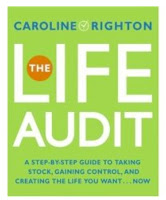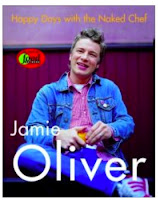
The New Year is the evil season for stocktaking (what am I? where am I? what does it all mean?), and yesterday I found myself staring, amidst a table of bargain books, at one entitled The Life Audit. How horrendous, to “audit” your own life like an accountant! But mysteriously, insidiously, I could not prevent myself from opening the book and reading myself in its terms. Particularly upsetting was the Relationship Area, kind of a heartless spreadsheet-of-the-heart marooned at the back of the volume, and in perusing the book’s criteria, I came to understand something that perhaps I already knew: that the only truly “successful romantic relationship” I have had in the last two years is with my Jamie Oliver cookbook.
Yes braised fennel with cherry tomatoes white wine and thyme. Oh, baby, pot-roasted poussins agro dolce. And just now with a delicious novel resting on my knee between bites I enjoyed some Neil’s Yard goat curd with beets followed by a unbelievably sexy braised lamb shank with parsnips and some bracing purple sprouting broccoli and I allowed myself to take stock of my own delight. Delight is usually sadly unmeasurable.
 A romance with a cookbook is an interesting proposition. Suppose you spill some olive oil on your lover … oh, perhaps this line of comparison belongs in a different blog… Some will say, in order to interact with your cookbook fully you need to put out a fair amount of effort, like a relationship, QED. (However, when you want your cookbook to go away and sit quietly on a shelf in the kitchen it will do so without complaint.) But I am finding the best way to interact with a cookbook is to imagine great feasts in the mind, to live the recipes in an ideal, Platonic world, as they more or less appear in the photos. It saves tremendously on cleanup. The two of you can spend happy hours gazing out windows, imagining forests of tender leeks and plum chutneys and etc. etc. and no one need be the wiser.
A romance with a cookbook is an interesting proposition. Suppose you spill some olive oil on your lover … oh, perhaps this line of comparison belongs in a different blog… Some will say, in order to interact with your cookbook fully you need to put out a fair amount of effort, like a relationship, QED. (However, when you want your cookbook to go away and sit quietly on a shelf in the kitchen it will do so without complaint.) But I am finding the best way to interact with a cookbook is to imagine great feasts in the mind, to live the recipes in an ideal, Platonic world, as they more or less appear in the photos. It saves tremendously on cleanup. The two of you can spend happy hours gazing out windows, imagining forests of tender leeks and plum chutneys and etc. etc. and no one need be the wiser.
A couple of days ago I found myself in the S & M Cafe (sausage and mash cafe, get your mind out of the gutter) staring through heavy eyes at the jetlaggy, noontime hour and trying to force down a despicably over-toasted black pudding, a crusty food scab. Friend J amusingly chose that cloudy gray moment to launch into a discussion about happiness. Do discussions of happiness only occur when one is unhappy? Or do they simply make one unhappy, by definition? Now, friend L (very different from J) had just recently referred to me and my general shtick as “the hapless pianist”–which I assumed was British for absent-minded, disheveled, somewhat given to wandering about randomly, etc. And while J was expounding on Plato’s idea of happiness I wondered aloud whether the etymology of “happiness” and “hapless” was the same. J poohpoohed my too-easy effort, but later, smugly, with unmeasurable delight, I informed him that I was right: that they both derived from the Middle English root hap.
One reads a great many essays on happiness these days, as per this article in the New York Times. Scientists are horning on our territory, whoever “we” are. But I want to propose a whole new Philosophy: the Philosophy of the Hap. Hap is so much shorter than happiness, and must therefore be much easier to achieve. Hap in Middle English is supposed to be good fortune or luck; a turn of good fortune. But I propose a more refined definition: a hap is a digestible unit of experience, and it lasts from the moment you are confronted with it until the moment you feel you have “understood” it, that is the moment when its irreconcilable wonder is destroyed by you in the relentless filing process of mental classification. So it is irresistible to try to understand experiences, but you must also accept that in the process you are kind of killing them, and that when you really feel you “understand” them, you don’t have them anymore. So, my philosophy is: the impossible prolongation of the Hap. Of course, my philosophy is impossible. Hence I am happily hapless.
Presumably, this blog is somewhat about classical music and in a quest for some topic relevance I’ll note that last night I was listening to Dinu Lipatti on friend S’s stereo system, who’s a very very admired pianist, as you all know, and so I fully expect to get some hate mail when I say the following. It was all very pleasant in its way and as I listened I began to “understand” him a bit more, but I found no Haps. No, not true: there were a few hints of Haps glittering here and there, not too clearly (because that would be “indulgent”), but the score, structure, line had been so digested and comprehended that the Haps were relegated to the corners and some larger construct was sitting in front of them. And they had no time to stretch themselves out. That is the clearest way I can express how his extraordinary playing makes me feel: not wondering at all. And life’s too short for that sort of thing, in my opinion. Meanwhile, before you all start throwing things at me for badmouthing this tremendous pianist, I’ve got troubles of my own… my Jamie Oliver cookbook is getting a little pissy and wants me to pay it some more attention, take it out for a nice dinner maybe once in a while, go dancing, have some fun, instead of sitting around on the couch and imagining what it might eventually do.



11 Comments
Robert Frost said happiness makes up in height for what it lacks in length. The older I get the more I see the wisdom in that. I enjoyed your post.Don’t resolve to change too much about yourself, you seem pretty together to me. . .
Jeremy,
Perhaps you are clenching too much in deconstructing Lupatti’s implied structure within his performance. Accept his structure as an elevated appreciation of the music, or reject it as too analytical for your taste buds. Stop living in listener’s purgatory.
-Jeremy G
What’s the opposite of hapless? Hapful? How about happening?
risotto.
cures all ills
a well used cookbook, like a well used relationship, always looks, used, soiled, comfy, trustworthy.
come on, donate a piano lesson to a school and bake up some cookies to go with it for community service.
Mr. Denk,
Long time reader, first-time poster here, but finally had to write today in response to your observations (gripes?) on Lipatti.
All I can say is: Yes, yes, yes. And thank you. I have been going back to those records for years, again and again, trying to catch some glimpse of the magnificent music making about which I have always heard so much. Usually enough, so many awed and fawning words from other lovers of musical nuance do indeed manage to reflect something otherwise inexpressible in this or that musical interpretation. And yet I have never been able find a moment in his records which looks beyond the otherwise obvious or downright literal. No mystery. No chance. But then perhaps the perfectly flat line is soothing in the ears of some?
At any rate, having not exactly been tormented over this conflict opinion for a while, I feel justified nonethless. And given my respect for your quite exceptional thought/writing, all the more so.
I look forward to more of your courageously individual meditations (gripes).
Best, Nik
At last! I can respond when I’m asked, “What’s the haps, man?
Interesting you fancy Lipatti. I adore Lipatti. I searched all over the house going upstairs and downstairs looking for the Brahms, Liszt, Chopin, Enescu disk. Nowhere to be found. How could this happen. Did I leave it at my in laws? Pity me. I needed to hear Enescu. Anything by Enescu. Enescu is like a crunchy bagette, tomato, soft cheese and olive oil in a world of Ritz crackers and craft cheese. Imagine that…
I note that you are coming to Clearwater soon.
you used the term “killing” when discussing the passing of a hap in your consciousness. i do not believe these haps are killed once you have understood them, rather they are part of the greater energy of the world, our collective consciousness, and when you experience a hap it comes to fruition within you, and you glean whatever it has to offer, and then let it pass and return to that collective energy, and someone else then has the opportunity to understand that hap.
as far as bashing the pianist, i will not throw things at you. i do the same thing as a singer. all of us musicians are cursed to notice things the general public does not. this happens to me most when something is just slightly out of tune. the general public won’t notice, but it drives me absolutely insane, and i can’t let it go!!!
hhmmm cookbook … want to come to my dorm room and cook me something? 🙂
many hugs to you, oh hapless pianist 😛
p.s. my word verification is “soymo”. is that like “soy and more”? can i go to “soymo” and buy soy products? hmmm…
off to finish diatonic techs homework now …
Hiya, Jerjer. Can I gently correct your understanding of “hap”? It means, not “good fortune or luck,” but fortune either good or bad, as in “happenstance.” Hardy calls it “crass casualty” in his sonnet “Hap” (also the source of the wonderful phrase “purblind doomsters”). So you might want to revise your pursuit of the Hap–you might get what you wish for…
Happy new year (if a bit belated),
DW